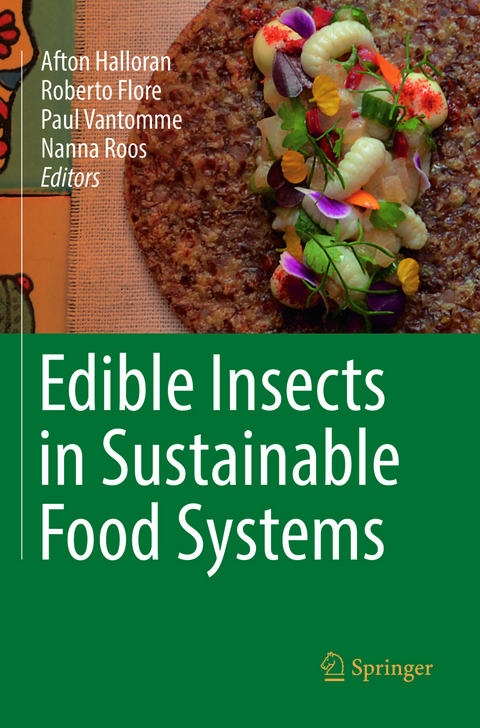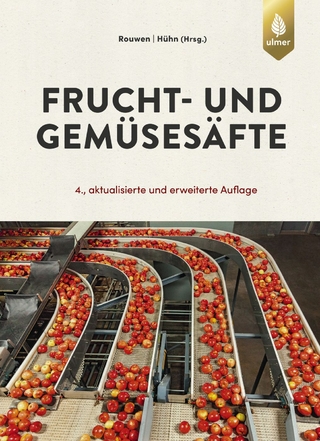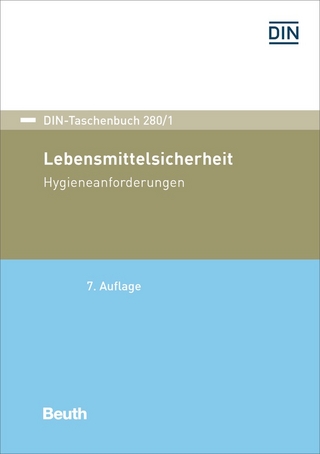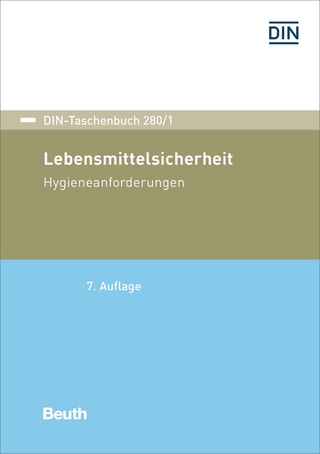
Edible Insects in Sustainable Food Systems
Springer International Publishing (Verlag)
978-3-030-08900-9 (ISBN)
- Titel nicht im Sortiment
- Artikel merken
This text provides an important overview of the contributions of edible insects to ecological sustainability, livelihoods, nutrition and health, food culture and food systems around the world. While insect farming for both food and feed is rapidly increasing in popularity around the world, the role that wild insect species have played in the lives and societies of millions of people worldwide cannot be ignored. In order to represent this diversity, this work draws upon research conducted in a wide range of geographical locations and features a variety of different insect species.
Edible insects in Sustainable Food Systems comprehensively covers the basic principles of entomology and population dynamics; edible insects and culture; nutrition and health; gastronomy; insects as animal feed; factors influencing preferences and acceptability of insects; environmental impacts and conservation; considerations for insect farming and policy and legislation.The book contains practical information for researchers, NGOs and international organizations, decision-makers, entrepreneurs and students.
Dr. Afton Halloran completed her PhD on cricket farming in Thailand and Kenya in August 2017 under the GREEiNSECT research project at the University of Copenhagen. She formally worked for the Insects as Food and Feed Programme at the Food and Agriculture Organization of the United Nations, where she co-authored Edible insects: future prospects for food and feed security. Roberto Flore is the Head of Research and Development at the Nordic Food Lab, University of Copenhagen. Roberto is one of the authors of On eating insects: essays, stories and recipes, a Phaidon Press publication. He is also one of the protaganists in the 2016 documentary BUGS. Paul Vantomme is a retired Senior Forestry Officer at the Food and Agriculture Organization of the United Nations (FAO). Paul is responsible for initaiting the Insects for Food and Feed Programme at the FAO. He is also a co-author on the publication, Edible insects: future prospects for food and feed security.
Part I: Introduction to insects.- Insects: key biological features.- Part II: Culture.- Insect consumption in the Arctic.- An ethnographic account of the role of edible insects in the Adi tribe of Arunachal Pradesh, North-East India.- Edible Insects And Their Uses In North America; Past, Present and Future.- Part III: Nutrition and health.- Insects and human nutrition.- The role of edible insects in diets and nutrition in East Africa.- Edible insects in a food safety perspective.- Part IV: Gastronomy.- A new world of ingredients: aspiring chefs' opinions on insects in gastronomy.- Su Casu Marzu: Per una Genealogia Gastronomica.- Edible Insects Uses in South Korean Gastronomy: "Korean Edible Insect Laboratory" Case Study.- Part V: Environmental impacts, conservation and future challenges.- Comparing environmental impacts from insects for feed and food as an alternative to animal production.- Conservationof edible insects in Sub-Saharan Africa.- Sustainable proteins? Values related to insects in food systems.- Marketing Insects: Superfood or Solution-food?.- Part VI: Insects as animal feed.- Small-scale fly larvae production for animal feed.- Insects as raw materials in compound feed for aquaculture.- Mealworm larvae production systems - Management scenarios.- Importance of insects for use as animal feed in low-income countries.- Sustainable Mealworm Production for Feed and Food.- Part VII: Consumer preferences and acceptability.- What governs selection and acceptance of edible insect species?.- Insects, the next European foodie craze?.- Kenyan consumers' experience of using edible insects as food and their preferences for selected insect-based food products.- Consumer acceptance of insects as food: integrating psychological and socio-cultural perspectives.- Customer Acceptance, Barriers, and Preferences in the U.S.- Means-end chain approach explains motivations to consume insect-based foods: The case of cricket-scones in Kenya.- Part VIII: Legislation and policy on the use of insects as food and feed.- PROteINSECT - Insects as a sustainable source of protein.- Insects in Thailand: National Leadership and Regional development, from standards to regulations through association.- The Effects of Regulation, Legislation and Policy on Consumption of Edible Insects in the Global South.- Legislation for the use of insects as food and feed in the South African context.- Current status of the insect producing industry in Europe.
"This book is a valuable and timely addition to the previous books on the topic of insects as food and feed, and is interesting for the professionals in the field of food and feed science, students, human and animal nutritionists and entrepreneurs." (S. Smetana, Journal of Insects as Food and Feed, September 21, 2018)
“This book is a valuable and timely addition to the previous books on the topic of insects as food and feed, and is interesting for the professionals in the field of food and feed science, students, human and animal nutritionists and entrepreneurs.” (S. Smetana, Journal of Insects as Food and Feed, September 21, 2018)
| Erscheinungsdatum | 18.02.2019 |
|---|---|
| Zusatzinfo | XVII, 479 p. 80 illus., 64 illus. in color. |
| Verlagsort | Cham |
| Sprache | englisch |
| Maße | 155 x 235 mm |
| Gewicht | 759 g |
| Themenwelt | Technik ► Lebensmitteltechnologie |
| Schlagworte | Edible Insects • Entomology • food sustainability • Food Systems • Insects as Animal Feed |
| ISBN-10 | 3-030-08900-2 / 3030089002 |
| ISBN-13 | 978-3-030-08900-9 / 9783030089009 |
| Zustand | Neuware |
| Informationen gemäß Produktsicherheitsverordnung (GPSR) | |
| Haben Sie eine Frage zum Produkt? |
aus dem Bereich


